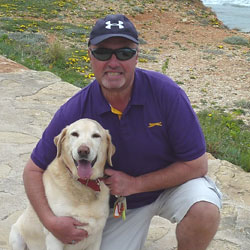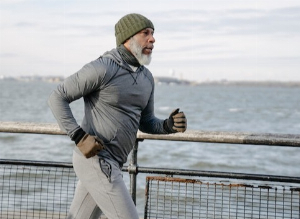Prostate cancer: the importance of PSA testing and positivity
Published 11 Apr 2018
Simon (@simonflys), a Carenity member, "highlights PSA testing for every bloke" he meets, having himself been affected by prostate cancer and been treated successfully due to early detection. He also underlines the importance of a positive attitude and of taking into consideration the feelings of caregivers, as their loved one's condition can be extremely difficult to bear.

Hi Simon, can you please introduce yourself in a few words?
I’m Simon Armstrong, 55, caucasian, married and live just South of Toulouse towards the French Pyrenees. I spent most of my working life in aviation and took early retirement, along with Lynda my wife, to enable us to pursue a change of lifestyle. Essentially, if you don’t change anything - nothing changes!

Tell us about your prostate cancer diagnosis: in what circumstances and at what age were you diagnosed?
I was diagnosed in January 2016 when I was 53. My GP in France had introduced annual full blood tests (including PSA) when I turned 50 - a pretty standard procedure here. It’s a 10 second blood test and no big deal - expect of course it’s pretty stressful waiting for the results - which are thankfully available online in a few hours! We watched my PSA level rise from 3.4ng/ml at age 50 to 7.1 at age 53. Time for a DRE (again no big deal) which more or less confirmed a growth on my prostate. This was followed by a biopsy under general anesthetic as a day patient which confirmed the cancer - pretty much in around 80% of my prostate. Scary stuff. I’d had absolutely no symptoms or issues - none.
Were you aware of this disease before the diagnosis, as well as of its risk and prevention methods? What was your reaction to the diagnosis?
I was fully aware of Prostate cancer before my own diagnosis having had a close, older long term friend with the disease. I’d never considered that I was at risk and I’d never heard of any prevention methods. I’d always thought it was an ‘old gits’ problem - but I know differently now. It can affect men from their 40’s onwards and can run in the family. The first person I called was my younger brother and got him to take a PSA test immediately - luckily he was and is just fine. Strange thing is you just get swept along with the ‘process’ and I never had a brick wall moment where the fact I had cancer suddenly dawned on me. It was a gradual realisation - so not too traumatic, I think it was worse for my wife, family and friends. I’ve never felt ill - to this day and I think that’s the hardest thing to accept. I spent a lot of time thinking ‘are they sure?’. What I hadn’t realised is how difficult people generally find it to talk about prostate cancer whereas breast cancer, bowel cancer etc. are all openly talked about. Prostate is almost a ‘taboo’ word - I still don’t understand why. I know us boys hate going to the doc - I did, but now, after my diagnosis I’ve certainly lost all my inhibitions!
What was your initial treatment plan?
Because of my relatively ‘young’ age I was strongly advised to have a full prostatectomy. I had many, many discussions with my team of 3 surgeons and am so lucky to live near to Toulouse where Cancerpole / Oncopole Europe is located - one of the best cancer facilities in the world. My Gleason scores were luckily fairly ‘low to medium’ so my cancer was termed as non-aggressive even though it was pretty widespread throughout my prostate. The decision to have a full prostatectomy was not taken lightly and my wife was involved at every stage - she attended all my consultancy sessions which was a huge support for me. I had a robotic (Da Vinci) procedure in june 2016 - a 5.5 hour procedure followed by 5 days in hospital. Throughout that time I had no pain and felt completely well! I had a bladder/urine catheter in place for around 8 days in total and, when removed, I suffered slight incontinence for around two months. This totally cleared up in no small part due to my Kegel8 device which I had used pre and post surgery. A fantastic device for strengthening the pelvic floor and restoring full bladder control. I also suffered from erectile disfunction for around 18 months to varying degrees which was helped by a mixture of solutions - cialis, vacuum pump and vitaros. With a full prostatectomy you no longer ejaculate at orgasm and the overall sensation is different - but considerably better than being dead! :-)
Are you currently on any medication? How often do you see your doctor and are you satisfied with the care you are receiving?
I don’t take any medication and see my doc every 6 months for an update and review of my PSA test. The care I’ve received has frankly been amazing - everyone I’ve come into contact with has reassured me at every step - even when I’ve wobbled. They deal with this stuff every day, it goes on every day - everywhere. Amazing people doing amazing stuff.
In what way has prostate cancer influenced your lifestyle and your daily activities?
Prostate cancer has made me appreciate just how tenuous life can be and has encouraged me to live it to the full. So, if anything I do more now than I did before. My wife and I often find ourselves saying ‘life’s too short - let’s just do it!’. I can’t pretend the whole thing wasn’t terrifying at times - it was, especially in those moments when I’ve been alone and my brain starts taking me places I don’t want to go. All the ‘what if?’ rubbish. I still worry that it may come back and I guess I always will even after I get my 5 year all clear - only another 3 years to go!
Have you ever participated in clinical trials?
No - no clinical trials but I’d certainly help out if I could. My mission is to highlight PSA testing to every bloke I come into contact with. A high reading doesn’t always mean cancer - but it could, and it could save your life. My reading was relatively low, no symptoms, no problems, no illness and yet I had prostate cancer.
What would you recommend other people affected by prostate cancer and their caregivers?
Just get on with it, talk about it, take as much advice as you can, look at all the options, do what’s best for you and those close to you. And for those who look after you - be gentle with them - they’re going through it with you and they can sometimes feel utterly helpless. Try not to be too ‘angry’ - much better to surround yourself with positivity and ignore all the crap that cancer throws at you and yours! You’ll have bad days - just do all you can to have more good ones.
7 comments

You will also like

Multi condition: “At present I am well, and I am trying to make the most of my life!”
12 Jul 2023 • 1 comment

 Facebook
Facebook Twitter
Twitter




